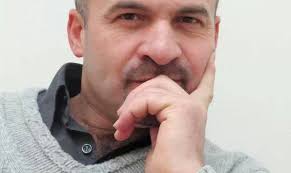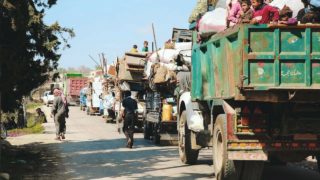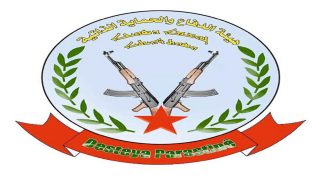Turkey has started a new operation in northern Syria last week. The Operation Peace Spring is the third Turkish incursion in north Syria, flowing the Operation Olive Branch in 2018 and Operation Euphrates Shield that concluded in 2017. In the past two operations, Turkey has managed to seize large areas. In this latest campaign, Turkey is attempting to control the entire border with Syria that stretches over 450 Kilometres and advance in to create a buffer zone.
Turkey claims that the reason behind its military effort in Syria is that the Democratic Union Party (PYD), and its military wing the Syrian Democratic Forces (SDF), is controlling these areas. PYD is the Syrian branch of Kurdistan Workers' Party (PKK), who has been fighting the Turkish state since late the 1970s. The PYD control over the border areas is a strategic threat to Turkey, and it poses a threat of further mobilizing the Kurds inside Turkey to restart military skirmishes against the state, or attempt to break the borders and link the Kurdish areas inside Turkey with those in north Syria.
However, Turkey is merely using this pretext to occupy new Syrian land, having already seized Hatay in the 1930s. Control over the coastal governorate was granted to Turkey by the French mandate that was ruling Syria then and the Syrian regime has relinquished their right of sovereignty over Hatay in 1980s. Since it was signed in 1998, Turkey and Syria have relied on the stipulations of the Adana Agreement to organize policing the borders between them and fighting terrorism. However the eruption of the uprising in Syria, and its escalation into an all-out war with regional and international powers involved in it, has reshuffled all the cards in The Syrian north.
Turkey’s latest operation in Syria is the biggest threat to Syria as a national state, and it could result in occupying further land that would, like Hatay, be annexed to Turkey.
Both Russia and Iran have said that Turkey has the right to carry out this operation, but they both insisted that it should be limited to stipulations of the Adana Agreement. However, the events unfolding in the last few days on the ground suggest that Turkey is intending to go much further and is aiming to completely defeat the Kurdish military forces, seize the areas under their control and use it to rehouse more than two million displaced Syrians. The majority of those Turkey intend to relocate are not originally from these areas and have been displaced from other towns in Syria.
When Turkish-backed forces seized Afrin and Jarabulus earlier, Turkey worked on integrating these towns into its system gradually; mainly the sectors of services, the police and the education. It is highly expected that it will do the same with the areas it controls as a result of the Operation Peace Spring, unless there is an international intervention to stop the operation and prevent the Turks advancing beyond certain parameters. SDF forces have been fighting against the Turkish incursion, and last weekend the PYD has announced making a deal with the Syrian regime and Russia to allow the Syrian government forces to advance in the formerly Kurdish-held areas all the way to the border to help the SDF defend these areas.
Any new land seizure by Turkey would mean a permanent annexation of this land, and Turkey would link it to Hatay, which would lead to increasing the Turkish influence in Syria and allow Turkey a bigger role in determining the future of Syria. However, that did not stop both Russia and Iran from supporting the operation, and there is no paradox in their stance. Both countries have approved of Turkey launching the operation, hoping it will limit the American influence and stop the SDF forces who have been the proxy for the USA on the ground. Both countries are occupying large areas of Syria. Yet, they are relentlessly condemning the SDF forces and accusing it of being an illegitimate force that constitute a threat to Syria as a state and to its future security.
Both Russia and Iran position in Syria is morally wrong, but they use the Syrian government’s invitation to them as a pretext. They draw their strength from the total subordination of the Syrian regime, and from the fact it has legitimized their presence on the ground.
The European Union has rejected this operation, its success would mean a surplus of power for Turkey that it can capitalize on in any future negotiations between the EU and Turkey. The American has condemned the operation, but their words lack actions. The USA has completely ignored the Kurds and the SDF’s pleas for enforcing a no-fly zone and for an international intervention to protect them.
The American policy recently announced that they have three options in dealing with the situation, none of which guarantees stopping the operation. The Americans are demanding that Turkey engage in a dialogue with the SDF, but in reality, it is too late for such a dialogue now. In the worst-case scenario, Turkey will manage to enforce a new reality in the East Euphrates, and it will force the SDF forces to retreat thirty kilometres away from the border. However, and even if the Turkish operation was to succeed, the main urban centres would remain subject to negotiations between Turkey and the SDF and the Americans would have to supervise such negotiations.
Turkey is facing immense pressures from Russia, the regime and Iran to limit the operation, the Syrian government forces already advanced to many border areas and Turkey, as a result, would have to accept certain parameters beyond which it can’t push further. However this plays out, the SDF will emerge much weaker as a result.
Turkey has insisted that this operation is spearheaded by the opposition “Syrian National Army”, and it claims that this entire operation aims at preserving Syria’s unity and defending its borders. This is a lie, and it is to be added to a long list of lies by Russia and Iran, who also maintain that their intervention is to protect the unity of Syria, while in reality both countries are occupying large parts of Syria.
In response to the Turkish forces advancing into Syria, Russia demanded that the Turks coordinate the operation with the Syrian regime, and fostered the negotiation between the Syrian regime and the PYD that lead to the PYD allowing the Syrian government’s forces to enter their areas in hope that this would halt the Turkish operation. Both Iran and Russia want to see the American troops leaving Syria, and want to restore the relations between Turkey and the Syrian regime, hoping to rehabilitate the Syrian regime both regionally and internationally.
Many sources have leaked that Turkey has already started coordinating their efforts with the Syrian intelligence, and that this communication started even before this operation. Turkey has confirmed that it has informed all the relevant sides about its operation in advance, including the Syrian regime. So, Turkey has established contact with the regime at the expenses of the Syrian opposition forces that is spearheading its operation, and in doing so, Turkey is betraying the opposition and setting the scene for future wars between the Arabs and the Kurds, and amongst the Arabs themselves in that region.
The idea of repatriating two million Syrian refugees, majority of whom are not natives to these areas, leaves one wondering why is Turkey not attempting to coordinate with Russia and Iran and the regime to repatriate the refugees it is hosting to the towns and cities they were displaced from originally in Ghouta, and Aleppo and Daraa? This question reveals that the real motif behind the Turkish policies is ending the Kurdish military control over these areas, and for that end, Turkey has coordinated with Russia. That, however, will lead to destabilizing these areas in the long run and could result in a long-term Turkish occupation of these areas. If that was to happen, then Turkey alongside Russia, will be responsible for maintaining the Syrians at a state of conflict among themselves. These hostilities could erupt and lead to a renewal of war at any moment, and that would necessitate the continued presence of both these occupying forces, Turkey and Russia, to prevent such escalation in the future.
Turkey will seize new territories in Syria. But how far will it advance, and would that indeed lead to creating a safe zone in the East Euphrates? Will such a zone be viable and stable? And why then did not Afrin and Jarabulus, which Turkey controlled earlier, turn into stable areas already? The truth is Turkey is not going to succeed in establishing such area, even if it wants to, because Turkey has not reached a final deal with Russia about Syria.
Turkey is trying to improve its position in any future negotiation with Russia. To achieve that goal, it hopes to capitalize on its control over these three regions of Syria; Afrin, Jarablus and any new territory it manages to capture now, in addition to its influence in Idlib as a guarantor, and the affiliation of part of the Syrian opposition and the Islamist brigades. Russia does not oppose that, as long as leads to reducing the American presence in Syria, which in turn, is in line with the Trump administration policies of reducing the USA military presence in Syria.
This Turkish operation is targeting the Kurds in the first place, and it aims at eradicating their presence all together. But it also threatens the who population of north-east Syria; The Arabs, the Kurds, and Assyrians and all the other minorities who live there. It aspires to increase the influence of Turkey and Iran and Russia, while it reduces that of the USA and EU. However, the worst criticism against it is that it is laying the foundation for future wars as it would cause friction in the social fabric of this ethnically and religiously diverse area. It could lead to a possible Turkish occupation of this area, but that would have to be in coordination with the Russia and the USA as well.






